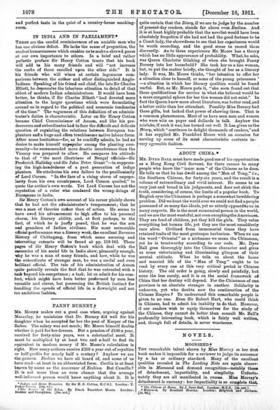FANNY BURNEY.t
Mn. MOORE makes out a good case when, arguing against Macaulay, he maintains that Dr. Burney did well for his daughter when he accepted for her the post of Keeper of the Robes. The salary was not much; Mr. Moore himself doubts whether it paid for her dresses. But a pension of £100 a year, received for forty-nine years, was a substantial asset. It must he multiplied by at least two and a-half to find its equivalent in modern money if Mr. Moore's calculation is right. How many authors receive £250 a year out of royalties or half-profits for nearly half a century ? Anyhow we are the gainers. Ereiina we have all heard of, and some of us have read—at least in an abbreviated form. Cecilia is at least known by name as the successor of Evelina. But Camilla? It is not more than an even chance that the average well-informed person would know anything about it. It is • Indian and Home Memories. By Sir H. S. Cotton, K.C.S.I. London : T. Fisher 'Urra in. [12s. 6,1.1 Vrhe K•err of the Robes. By Frank Frankfort Moore. London: Hodder and Stoughton. [16s. net.] quite certain that the Diary, if we are to judge by the number of present-day readers, stands far above even. Evelina. And it is at least highly probable that the novelist-would have been absolutely forgotten if she had not had the good fortune to be a Court lady, the shrewdness to see that her experiences would be worth recording, and the good sense to record them discreetly. As to these experiences Mr. Moore has a theory which has no little appearance of probability. What, he asks, was Queen Charlotte thinking of when she brought Fanny Burney into her household P She took her as a tire woman, but, to put the matter briefly, she thought of her as a literary lady. It was, Mr. Moore thinks, "her intention to offer her a situation close to herself, or some of the young princesses ' —a situation in which her literary qualities would be found useful. But, as Mr. Moore puts it, "she soon found out that these qualifications for service in what she believed would be a more congenial sphere for her tire woman did not exist." In fact the Queen knew more about literature, was better read, and a better critic than her attendant. Possibly Miss Burney had these gifts, but lacked that power of showing them. That is a common phenomenon. Most of us have seen men and. women who were wits on paper and dullards in talk. Anyhow the mistake, if such it was, has turned out well. It has given us the, Diary, which "continues to delight thousands of readers," and it has supplied Mr. Frankfort Moore with an occasion for serving up some of its most characteristic contents in., very agreeable fashion.


















































 Previous page
Previous page